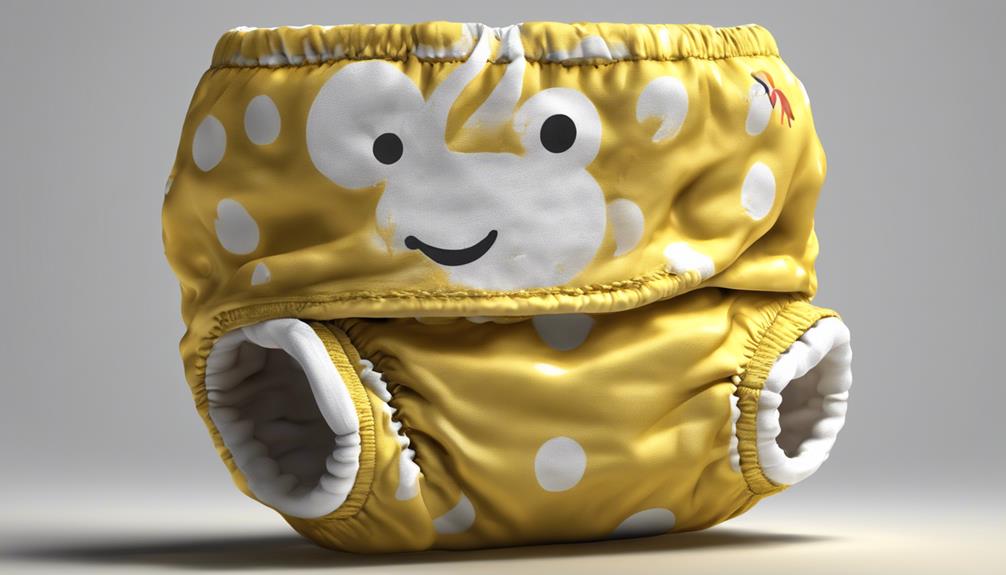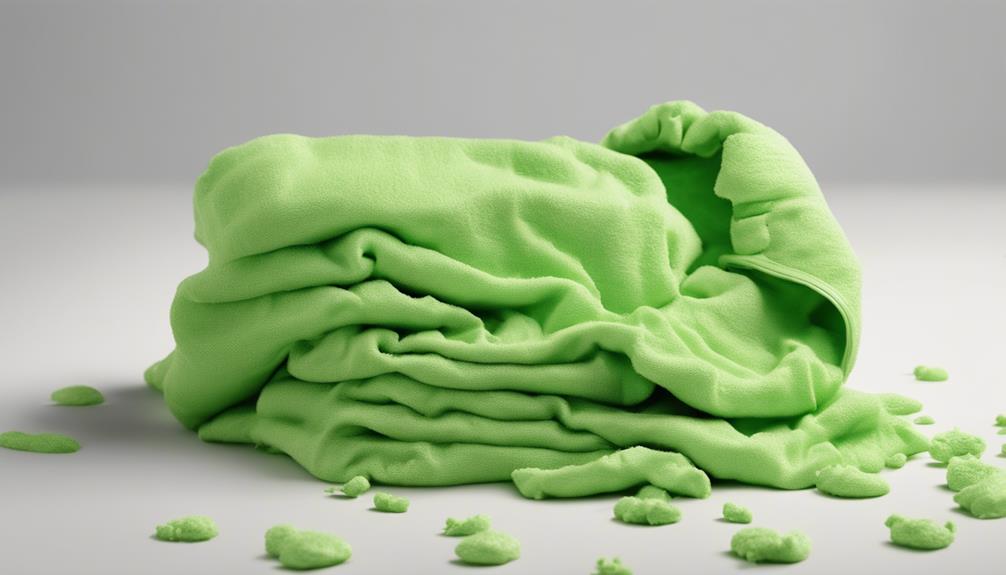As new parents, we were taken aback when our baby's poop suddenly turned a shade of green. Understanding what color newborn poop should be can be puzzling, especially with the array of hues that can appear in the diaper.
But fret not, deciphering the colors of your little one's bowel movements is an essential aspect of infant care that can provide valuable insights into their well-being. Let's unravel the mystery together and discover why poop hues matter more than you might think.
Key Takeaways
- Meconium transitions from black to dark green, then yellow, indicating normal digestive function.
- Yellow poop reflects healthy digestion, nutrient absorption, and breastfeeding success.
- Brown or orange poop post-meconium signals effective milk digestion and nutrient processing.
- Green poop, a temporary phase post-meconium, should shift to yellow; consult if prolonged.

Keekaroo Peanut Changer Baby Vanilla – The Original Made in USA Easy-to-Clean Changing pad and The only Shell Over Foam, Fully Water Repellant, Wipeable Diaper pad, Wipe-Clean Changing pad
COLORS FOR EVERY NURSERY – Check out the variety of colors available for every style
As an affiliate, we earn on qualifying purchases.
As an affiliate, we earn on qualifying purchases.
Black
Black poop in newborns, also known as meconium, signifies the normal passage of the first stool after birth. This dark, sticky substance is a combination of amniotic fluid, bile, and intestinal secretions that the baby ingested while in the womb. Despite being challenging to clean, the presence of meconium within the first few days of life is a reassuring indication that the baby's digestive system is functioning as it should. As the days progress, the color of the stool typically changes from black meconium to dark green and eventually to yellow stools.
However, if black stools persist beyond the first week, it could be a cause for concern and may indicate a potential health issue that requires medical attention. Parents should monitor the stool color modifications closely during this time to confirm the baby's digestive health is on track. Remember, while black meconium is normal, ongoing black stools may warrant a conversation with a healthcare provider.

Baby Poop Color Chart, Infant Stool Guide for New Parents & Caregivers Canvas Poster Bedroom Decor Landscape Office Room Decor Gift Unframe-style Unframe-style 12x18inch(30x45cm)
【Durable & High Quality】 All our wall art prints are made of high-quality canvas, thick and not easy…
As an affiliate, we earn on qualifying purchases.
As an affiliate, we earn on qualifying purchases.
Yellow

Yellow stool in newborns is typically a positive indication of healthy digestion and milk intake. This color change from the initial black meconium to a yellow hue usually happens within the first few days after birth. The yellow color of a breastfed baby's poop is due to bilirubin, a substance formed during the change of red blood cells in the liver. It signifies that the baby's digestive system is functioning well and that they are receiving the necessary nutrients from breastfeeding. Monitoring the yellow poop color can give parents insight into their baby's health and feeding patterns. Here is a table summarizing key points about yellow poop in newborns:
| Aspect | Information |
|---|---|
| Color | Yellow, changing from black meconium |
| Source | Bilirubin from the baby's liver |
| Significance | Indicates healthy digestion, proper nutrient absorption, and adequate milk intake |
Understanding the significance of yellow poop can provide reassurance to parents regarding their newborn's well-being.

My Brest Friend Nursing Pillow – Deluxe – Enhanced Comfort w/ Slipcover – Ergonomic Breastfeeding Pillow For Ultimate Support For Mom & Baby – Adjustable Pillow W/ Handy Side Pocket, Soft Rose
ERGONOMIC DESIGN: Elevate your nursing journey with our unique nursing pillow. The wrap-around feature ensures ideal positioning &…
As an affiliate, we earn on qualifying purchases.
As an affiliate, we earn on qualifying purchases.
Brown or Orange
After the initial phase of black meconium passing, the color of newborn poop typically changes to a healthy brown or orange hue, signaling the digestion of breast milk or formula. This shift marks an important stage in the baby's digestive system as it adapts to the new diet.
Seeing brown or orange poop in newborns is reassuring for parents, as it indicates that the baby's body is effectively processing the nutrients from breast milk or formula. It's normal for newborns to have varying shades of brown or orange poop in the first few days after birth, reflecting the gradual adjustment of their digestive system.
Monitoring the consistency and frequency of these bowel movements alongside the color is essential for ensuring the baby's well-being during this developmental period. Remember, changes in color, consistency, or frequency should be discussed with a healthcare provider to address any concerns promptly.

Frida Baby Mobile Medicine Cabinet Travel Kit, Set Baby Essentials Gift Set Includes NoseFrida Snotsucker, Rectal Thermometer, MediFrida Medicine Dispenser with Portable Carrying Case
ALL-IN-ONE BABY HEALTHCARE ESSENTIALS ON THE GO: The Frida Baby Mobile Medicine Cabinet features a portable travel case…
As an affiliate, we earn on qualifying purchases.
As an affiliate, we earn on qualifying purchases.
Green

Green newborn poop, while it can be concerning to parents, is a common occurrence in the first few days after birth. Here are some key points to contemplate:
- Normal Shift: Green newborn poop is a natural shift from meconium, the baby's first stool, which can have a greenish-black appearance.
- Bile Pigments: The green color of the poop is attributed to the presence of bile pigments in the baby's digestive system.
- Temporary Phase: Typically, green poop in newborns is temporary and should evolve into a yellow hue as the baby continues feeding.
Understanding these facts can help parents navigate this aspect of their newborn's health.
However, if green poop persists beyond the initial days, it's advisable to seek guidance from a healthcare provider for further evaluation to safeguard the baby's well-being. Remember, staying informed and seeking professional advice when needed are essential steps in caring for your newborn's health.
Frequently Asked Questions
What Color Is Healthy Newborn Poop?
Healthy newborn poop varies but is typically yellow or yellow-brown. Changes from black meconium are normal. Diet impacts color. Consistency ranges from soft to firm. Monitoring is key for digestive health assessment.
What Colour Should Poop Be Guide?
We monitor newborn poop color for digestive health. Yellow is common in breastfed babies, while formula-fed babies may have varying hues. Unusual colors like white, red, or black require healthcare provider evaluation. Understanding these changes helps guarantee the baby's well-being.
Why Is My Babies Poop Dark Green Almost Black?
Rest assured! Dark green or almost black newborn poop is usually meconium, a mix of prenatal goodies. It's normal, but if it sticks around past a week, baby may need a check-up.
What Does Milk Allergy Poop Look Like?
Milk allergy poop can appear green, frothy, and mucus-filled. It might smell bad and have undigested food. Blood traces could indicate an allergy, accompanied by gas, fussiness, or rashes. Confirm with a doctor and adjust the diet accordingly.
Conclusion
To sum up, keeping an eye on your baby's poop color is vital for monitoring their health. Remember, black poop is normal at first, then it changes to yellow, brown, or orange. Green poop can indicate a dietary change.
If you notice any concerning changes or persistent issues, don't hesitate to reach out to your healthcare provider. Your baby's poop may seem like a small thing, but it holds a lot of valuable information about their well-being.
So keep on top of it, because their poop is truly a window into their health!









